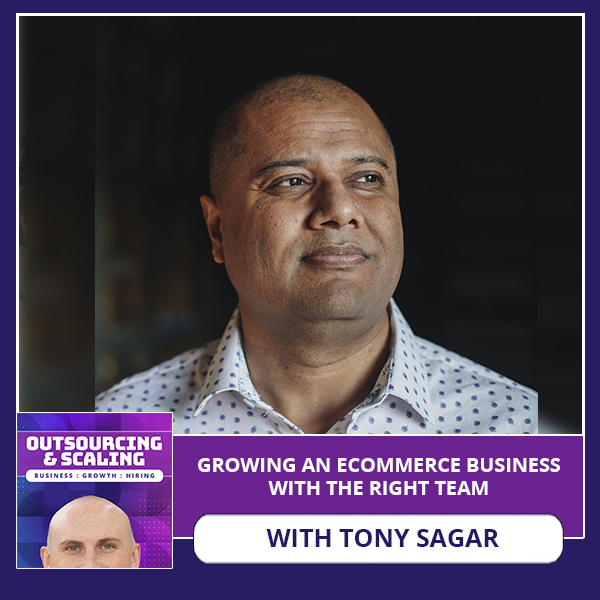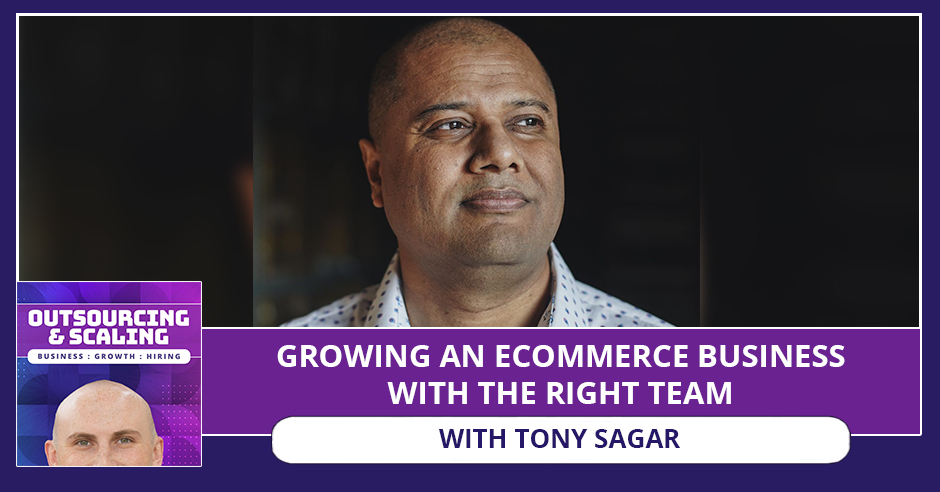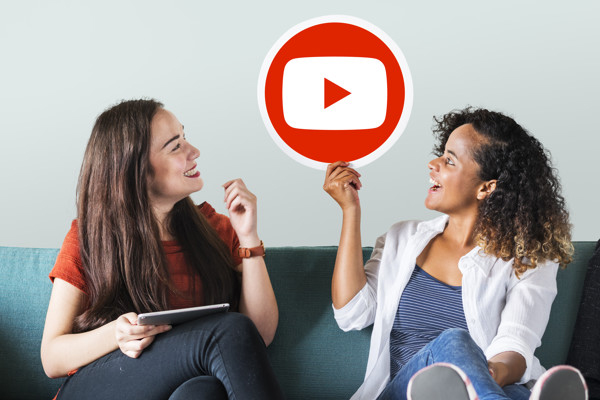


From losing money to turning everything around and doing over $1.6 million dollars in sales, Tony Sagar shows that getting your way up back to the top is not impossible. Today, Nathan Hirsch interviews serial entrepreneur and sleep expert Tony Sagar of Down Under Bedding. Along with every modern eye on this planet, Tony has used the web to answer his entrepreneurial questions. He shares how he capitalized on YouTube channels for learning eCommerce and some tips on hiring a VA or a freelancer, and the common mistakes to avoid when doing so. Learn more from Nathan and Tony as they get down on growing an eCommerce business.
—
Listen to the podcast here:
[smart_track_player url=”https://www.podetize.com/statsapi/www.podetize.com/wp-content/uploads/fileuploads/11-5b145ef137b51b3d1af0633e9305c43d/02/2020/b22ccccbce642e526b2b8bd88e90f5ce.mp3″ title=”Growing An eCommerce Business With The Right Team With Tony Sagar” artist=”Nathan Hirsch” image=”https://freeup.net/wp-content/uploads/2019/04/OAS.png” ]
Download the audio file here.
Growing An eCommerce Business With The Right Team With Tony Sagar
This is Tony and I want to give you my personal experience that I would highly recommend you try out the FreeUp marketplace. It’s amazing. The main thing is the people, the requests, the easy to use platform. I definitely recommend you check it out because you have nothing to lose. I’ve tried other websites like Fiverr, Upwork and so forth. I think that this model is the way to go.
—
My guest is Tony Sagar. Tony, how are you doing?
I’m great. I’m pumped. How are you?
I am doing great. Tony is a long time FreeUp client. We’re pumped to have him on. He’s a serial entrepreneur and known as the sleep expert through his premium bedding brand, Down Under Bedding. In 2019, he did $1.6 million in sales versus only $500,000 a few years ago. He was losing money back in the day. He was able to turn everything around. We’re going to talk all about that. First, let’s take a gigantic step back. Tony, what were you like as a child growing up? Were you a straight-A student? Were you a rebel? Did you always know you wanted to be an entrepreneur?
I wasn’t good at school. It wasn’t my forte, but I was a serial entrepreneur. My dad had a bunch of businesses and it was great to see what was going on and learn from a young age.
Walk me through your journey. How did you get into eCommerce originally? Did you go to college? Did you have jobs before that? I’d love to hear your story.
I’ve been in business for many years. I’ve had a multitude of different businesses combined. I’ve done over $40 million in sales at my peak. I was running a retail chain here in Toronto, Canada where I’m located. Of six retail locations, we were doing over $6 million a year. That was the heyday and things were good. We had carved out a good niche, then the internet came and we weren’t ready. A few years ago, when we were almost ready to shut down, I discovered Amazon. To find out how online works and to get involved in changing our business model and the journey has been spectacular.
Can you walk us through that first year? I feel like that’s the make and break year for eCommerce businesses. There’s so much to learn. There’s so much going on in Amazon, in marketing, in the inventory and the sourcing. Where did you begin? How did you figure it all out?
For me, it was understanding how the online model works and where we can realize the margins. In our business specifically, we’re dealing with a higher-end price point. We’re dealing with the average sale for us being about $123,000. People are buying products, duvets, higher-end feather beds and mattresses from anywhere up to even a few thousand dollars. It became a challenge for us to say, “Where can we explore those niches to make money?” You have to do your research. I say that if people are willing to spend the time, nothing is better than YouTube. You can get 80% of what you need on YouTube.
Are there any YouTube channels that you recommend for learning eCommerce?
There are a lot of great ones. I follow Scott Voelker from The Amazing Seller. He’s amazing. I’ve been following him from the beginning. Your podcast, I’ve learned so much about what we’re going to be talking about, which is the world of VAs and agencies. I never had to deal with that before. For me, it was enlightening and rewarding to be able to find FreeUp. It frees up a lot of my time to let them take care of a lot of things. That’s the great thing about it. It’s been a journey and we can never stop learning.
Scott Voelker is awesome. He’s been on The Outsourcing And Scaling Show. I’ve been on his podcast three times. He has an awesome community. He’s all about building the brand, which is where eCommerce is going now. Let’s talk about VA and freelancers. Who was your first hire and how did that go?
The best way to describe it is I’m going to tell you about the three biggest VA mistakes and what I learned. My first hire started out in January. What happened was, and this was a good learning experience for a lot of people out there, I was in the market for a VA and I was posting questions on different Facebook groups as a lot of people do. I was given a couple of recommendations and then I realized later on in retrospect that these were sellers. These are other VAs marketing and looking at pushing business towards their company, clients or friends. That opened my eyes. I never knew that could even be happening.
What ended up happening was I hired some guy out of Pakistan. The interview process went through two different interviews and everything seemed great. He’s been working at a big center for years and he said he knew this and he knew that. What ended up happening was as soon as I paid him his first month, his whole attitude changed. He had agreed to be available for calls via Skype and suddenly he said he didn’t want to do that. That wasn’t what we agreed to. For me, the challenge became, “How can I get my money’s worth? I don’t think it’s going to work out, but I want to see what he can do.” In the end, it wasn’t a whole lot. I learned from that experience that I have to vet these people out better. I need service because even my interview process didn’t do the job because anybody can say yes, but we don’t know until we get granular and start working with them.

What advice would you give to someone who’s hiring that VA for the first time?
I would say write down your questions. Write down what’s important to you. If you need them to be available for Skype, Zoom chats or whatever it is, if you need them to be available on weekends and all sorts of things, make sure you clearly have that conversation. I like to ask other questions. I like to ask, how many other clients do you have? I need to know how well their time is being diversified. If they’re busy, maybe that’s not a good fit either because they may not have a lot of time for me. It’s a balancing act.
I always say, prioritize that interview. All the things that you know you need like if you need them at a certain time if they need to use Time Doctor if they have to be familiar with a certain tool, those are the questions you ask upfront. If they can’t do those things, don’t spend the next 40 minutes interviewing them, then ask those questions at the end and realize they can’t do those few things that are necessary for the job. Asking the right questions and knowing exactly what you want is key. You don’t want to get someone set up and then start adding things or being like, “By the way, I need you to do this. If you can’t, you can’t work for me.” You’ve already invested time and energy into them. Talk to me about the VAs that you use now for your eCommerce business. Who are you using? What skill sets? How do you structure it?
What we do is we’ve tried to prioritize what’s important to us. We hired from FreeUp somebody to redo our Pinterest account. What I had done is watched a bunch of YouTube videos and I got a basic understanding, then we went on to FreeUp and said, “This is our budget. We want this work done.” The key thing was we laid out clearly what the scope of the role was, which was very important because about two weeks later, he came back to us saying, “This wasn’t part of my job.” I showed him that it was included. He said okay and he went back and did it. I was surprised this happened, but now that we had it in writing, it helped avoid any problems.
How important is getting it in writing? That’s my thing. Whenever I run meetings, I’m not running meetings like this face-to-face. I’m running meetings on Skype and using chat. If anyone misses it, they can see it. If the situation says, “Nathan, you never said that.” It’s like, “I did. It’s right here.” It cuts through all the flop. It’s very black and white. We either confirmed and agreed, got on the same page and move on or we didn’t.
That’s a great tip that I learned from you and that’s what I’m trying to say. Thank you for all these nuggets you’ve dropped. It’s been amazing.
What other freelancers and VAs do you use?
We’re looking for somebody for video editing. I realized there are a lot of good people out there in the process of that. I would also advise people to don’t give up hiring locally as well. In terms of my story, I had a bunch of contractors. We still have one location in Toronto and those people got converted in a sense to VAs. I was jokingly saying this, “When I have a ten-minute meeting with my staff of 3 to 4 people here, that’s 50 emails back and forth with somebody remotely. That’s the advantage of somebody local. You can talk, show samples, discuss things. It makes a big difference. For my price point, a lot of remote VAs, the price is about U$10, U$11. That’s about C$15 and I’m paying anywhere from C$18, sometimes C$20 for somebody who can do a multitude of things, not just be my VA and do graphic design and video or whatever. They can also help with customers or in the back with warehouse work. Everybody’s got to multitask and we don’t want to forget that we live and work in North America. Wherever possible, we should always explore that option as well.
I will say be careful hiring people in the US at that $10 to $20 an hour range. They’re only going to be happy with that rate for so long. You can only live in the US off that rate for so long. You either have to be willing to increase their rate and be good getting them into that $20 to $30 range eventually or if you invest all the time into them, you’re going to have to start over again. That’s why for a lot of following tasks, I prefer going to the non-US route because you can get someone good in the $5 to $10 range. If you like them, you can increase their rate a little bit and then they’ll be loyal to you for a while. That’s just my two cents and I’m obviously biased. I do everything remotely. What about the higher-level stuff? You talked a little bit about the following. You mentioned video editing, which is more of that doing tasks and hiring a specialist. Do you ever hire the agencies, the strategists, the consultants, the high-level freelancers to execute strategies for you?
Yeah, that’s my number two in 2019 where I hired an agency and it didn’t work out. When I look back in that granular process, I think back, how did I come to that point where I would make such an error? I hope that I learned from my experience and I hope by me talking about it, people learn from that experience. You have to know enough about something. You can’t be a novice. The best analogy I can use is like a car. I don’t have to be a mechanic to know if I go in and thousands of dollars in repairs done on a car that’s maybe still under warranty even or off warranty.
It’s the same thing when it comes to any work, whether remotely or in North America. The key is you want to know enough. You might not be an expert but you can at least guide the process. If you’re a novice, that’s when you can be taken advantage of. That’s what I think happened to my mistake when it comes to the agency. I didn’t realize I’m spending an extra $3,000, $4,000. Some people may be paying $5,000, $10,000 a month. I need to see enough justification and reward compared to when I’m doing it myself when I’m bootstrapping. That was the main thing where I didn’t see enough of the reward.
How do you communicate? You have people in the US near you. You’ve got people all over the world. What communication methods are using? What tips and advice can you give about communication?
I’m using primarily Zoom and Skype, especially for video. It’s very important to record maybe some of those interviews and I’m definitely writing things down because those are the keys. That way, I find when you’re talking to somebody remotely, the connection may be not clear. You’re buzzing in and out, there are people in the background and a lot of noise. The key is writing things down and making notes so you can work from that. There’s less misunderstanding when you’re not able to have a meeting with them.

Let’s talk about growing eCommerce businesses. What other advice do you have now that you’re years down the line, you’ve had some failures, and you’ve now had a lot of success? How are you figuring out what the next step for your business is?
I would say being in tune with what’s going on. There are many changes. The biggest thing that’s helped my business is I’m paying for private one-on-one mastermind right now. Instead of always investing the money in travel or networking, if I use that money and if I could do a private screen-share with the smartest person that I could find and we get granular and say, “This template, how can I improve it? What am I doing wrong here?” or this and that. That’s been the most beneficial thing that’s been happening to me. It helped me so much in my business.
Talk to me about sleep. I’m someone that occasionally struggles to get a good night’s sleep. I’ve got a lot on my mind and I’m doing a lot. I’m waking up early sometimes and I’m staying up late. What tips do you have as a sleep expert?
I would definitely say find and make your sleep area the most comfortable. A lot of people tend to sleep hot and those can be a problem. We sell a lot of cooling sleep products related to that niche. The thing is you have to find what works for you. I personally don’t like sleeping with the air conditioning on all night, unless it’s very hot and humid but some people need it. I like to keep the window open if you can or have a fan. Anything that works for you.
Tony, this has been great. Where can people find out more about you and what are you most excited about for the rest of the year?
I’m excited about Friday and the rest of the year. I’m excited about all the changes that are happening. I feel a lot of them are positive, so we need to move ahead. If people want to contact me further, please contact me right through my website, which is DownUnderBedding.com.
Thanks so much for joining us. I’m sure you and I will continue to talk throughout the rest of the year.
Thank you, Nathan. Take care.
Important Links:
- Tony Sagar
- Down Under Bedding
- The Amazing Seller – Scott Voelker’s YouTube channel
- Scott Voelker – previous episode
- DownUnderBedding.com
About Tony Sagar
 I’m a serial entrepreneur and known as the Sleep Expert though my premium bedding brand Down Under Bedding.
I’m a serial entrepreneur and known as the Sleep Expert though my premium bedding brand Down Under Bedding.
Last year we did 1.6M (CAN) from all revenue streams versus only 500K 5 years ago and losing money
